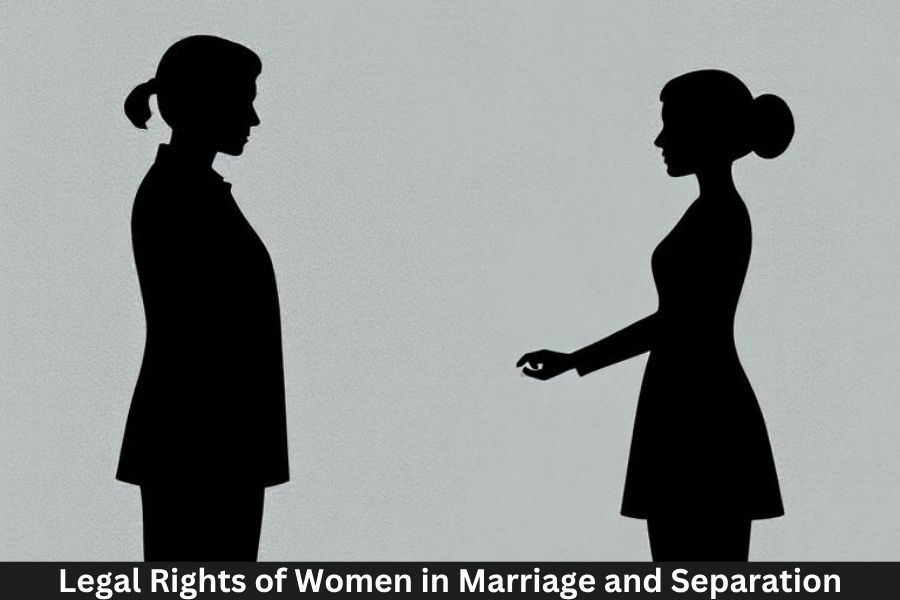Marriage is a fundamental institution in many societies around the world, and women, like men, have specific legal rights and protections when it comes to marriage and separation. Understanding these legal rights is crucial, as they ensure fairness and protect women from discrimination, exploitation, and unfair treatment. Whether you are entering marriage or facing separation, knowing your rights can help you navigate the complexities of these life events with greater clarity and confidence.
In this article, we will explore the legal rights of women in marriage, as well as during separation and divorce. We’ll cover property rights, custody issues, alimony, and more, giving you a comprehensive understanding of how the law treats women in these important areas.
What Are the Legal Rights of Women in Marriage?
Marriage comes with several legal benefits and responsibilities for both partners. For women, these rights are designed to protect their interests and ensure they are treated equally under the law. Let’s break down some of the key legal rights women have in marriage.
Right to Equal Treatment in Marriage
Women have the right to be treated as equals in marriage. This means they cannot be subjected to discrimination or unequal treatment by their spouse. This includes:
- Equal rights in making decisions regarding family finances, property, and personal matters.
- Protection from domestic violence or abuse, which is a clear violation of their legal rights.
Property Rights
In many jurisdictions, women have the right to own and control property, whether individually or jointly with their spouse. These property rights vary depending on whether the marriage is under a community property or common law system.
- Community Property: In community property states or countries, both spouses have equal rights to property acquired during the marriage.
- Common Law: In common law jurisdictions, property may be divided based on individual contributions to the marriage.
Right to Financial Support
Women have the right to financial support from their spouse, particularly during marriage. This includes:
- Joint income: Wages and salaries earned by either spouse may be considered jointly owned.
- Healthcare and benefits: Spouses often have the right to claim health benefits, insurance, and social security benefits from their partner.
Reproductive Rights
Reproductive rights in marriage are also a key consideration. Women have the legal right to make decisions regarding their own bodies, including access to contraception and the right to choose whether or not to have children.
Legal Rights of Women During Separation and Divorce
Separation and divorce can be some of the most stressful and legally complex situations a woman may face. The legal rights during separation are different from those in marriage, but they still protect women’s interests, especially in areas such as custody, property division, and support.
Right to a Fair Property Division
One of the most critical aspects of divorce is the division of property. In many legal systems, women have the right to an equitable division of marital property. This typically involves:
- Marital Assets: Property acquired during the marriage, such as homes, cars, savings, and investments, is subject to division.
- Separate Property: Property owned by a woman before marriage or received as a gift or inheritance during the marriage may not be divided.
Laws vary widely across different states or countries, but in general, women have the right to an equitable share of the marital assets.
Custody and Parental Rights
When children are involved in a separation or divorce, women have legal rights concerning custody and visitation. Women can pursue either full custody or joint custody, depending on what is in the best interests of the child.
- Physical Custody: Refers to where the child will live.
- Legal Custody: Refers to the right to make important decisions about the child’s education, healthcare, and religion.
In most cases, both parents have a right to be involved in the child’s life, but the law typically considers the child’s well-being as the top priority.
Spousal Support or Alimony
In many legal systems, women may have the right to receive spousal support (alimony) if they are financially dependent on their spouse. The purpose of alimony is to ensure that a woman can maintain a standard of living similar to what she was accustomed to during the marriage.
Alimony may be awarded based on:
- The length of the marriage.
- The standard of living during the marriage.
- The woman’s financial need and the spouse’s ability to pay.
Protection from Domestic Violence
One of the most critical legal protections for women in marriage is the right to protection from domestic violence. This includes physical, emotional, and psychological abuse. Women who face abuse have the legal right to:
- Seek a restraining order or protection order to prevent the abuser from contacting or approaching them.
- Seek temporary or permanent custody of children if abuse is a concern.
- Access legal aid and support services to assist in the process of escaping an abusive relationship.
Domestic violence laws vary by jurisdiction, but in general, women are protected from all forms of abuse by law.
The Divorce Process and Legal Rights of Women
The divorce process can be complex and varies depending on where you live. However, in almost all legal systems, women have the right to:
File for Divorce
Women have the legal right to initiate divorce proceedings, regardless of who is at fault in the marriage. Divorce laws differ by region, but in most places, a woman does not need to prove fault to get a divorce.
Request Legal Representation
Women are entitled to legal representation during the divorce process. If financial constraints are an issue, they may qualify for legal aid or public defenders to help with divorce filings, hearings, and mediation.
Financial Settlement
Women are entitled to a fair financial settlement upon divorce. This includes:
- Property division: The fair division of assets and liabilities accumulated during the marriage.
- Spousal support/alimony: Ongoing financial support if the woman is entitled to it.
Right to Remarry
After the divorce is finalized, women have the legal right to remarry, just like their male counterparts. There is no law preventing a woman from entering into another marriage.
The Importance of Legal Counsel in Marriage and Separation
Navigating the complexities of marriage and separation requires expert legal guidance. It’s essential for women to seek legal counsel to ensure their rights are fully protected during both marriage and separation. A qualified family law attorney can:
- Provide advice on property rights and alimony.
- Assist in custody battles and child support issues.
- Ensure that any separation or divorce settlements are fair and equitable.
Conclusion
Understanding your legal rights as a woman in marriage and during separation is essential to ensure fairness and protection in your relationship. From property division to custody rights and protection from abuse, the law is designed to protect women’s rights in both marriage and divorce. Whether you’re entering a marriage or dealing with the end of a relationship, knowing your rights and seeking the right legal help can make a significant difference in achieving a fair and just resolution.
FAQs
1. Can a woman get a divorce without her husband’s consent?
Yes, in most jurisdictions, a woman can file for divorce without her husband’s consent. Divorce can be granted based on various grounds, such as irreconcilable differences.
2. What happens to the property in a divorce?
In divorce proceedings, marital property is typically divided between the spouses. The division may be equal or based on the contribution of each spouse to the marriage.
3. Can a woman request alimony after divorce?
Yes, a woman can request alimony (spousal support) if she is financially dependent on her spouse and needs support to maintain her standard of living after the divorce.
4. Are there legal protections for women from domestic violence?
Yes, women are legally protected from domestic violence and can seek restraining orders and custody of children in cases of abuse.
5. What are the custody rights of a woman after divorce?
In divorce proceedings, women have the right to seek full or joint custody of their children, with the best interests of the child being the primary consideration.



